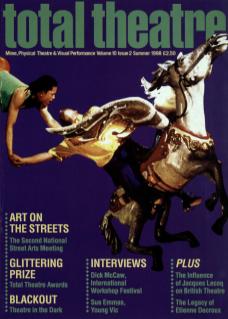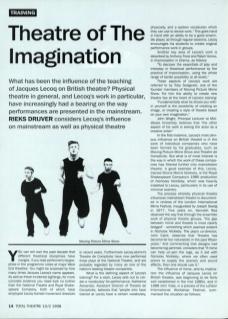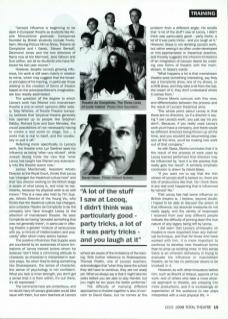You can tell over the past decade that different theatrical disciplines have merged if you read performer's biographies in the programme notes at major West End theatres. You might be surprised by how many times Jacques Lecoq's name appears. As well as these incidental sightings, for more concrete evidence you need look no further than the National Theatre and Royal Shakespeare Company, both of which have employed Lecoq-trained movement directors in recent years. Furthermore Lecoq alumnis Theatre de Complicite have now performed three plays at the National Theatre, and are probably regarded by many as one of the nation's leading theatre companies.
What is the defining aspect of Lecoq's training? For a start, Lecoq sets out to create a vocabulary for performance. Katherine Alexander, Assistant Director of Theatre de Complicite, believes that ‘people who have trained at Lecoq have a certain vocabulary, physically, and a spoken vocabulary which they can use to devise work’. This goes hand in hand with an ability to be a good ensemble player, as through regular sessions Lecoq encourages his students to create original performance work in groups.
Another key area of Lecoq's work is described by Anthony Frost and Ralph Yarrow, in Improvisation in Drama, as follows:
‘To discover the essentials of play and interplay in theatrical performance by the practice of improvisation, using the whole range of tactile possibility at all levels.’
These aspects of Lecoq's work are referred to by Toby Sedgwick, one of the founder members of Moving Picture Mime Show. For him the ability to create new theatre lies at the heart of Lecoq's training:
‘Fundamentally what he shows you within yourself is the possibility of creating an image, or creating a style of theatre based on your own imagination.’
John Wright, Principal Lecturer at Middlesex University, believes that the other aspect of his work is ‘seeing the actor as a creative writer’.
In the first instance, Lecoq's most obvious influence on British theatre is in the work of individual companies who have been formed by his graduates, such as Moving Picture Mime Show and Theatre de Complicite. But what is of most interest is the way in which the work of these companies has filtered further into mainstream theatre. A good example of this, Lecoq-trained Shona Morris believes, is the Royal Shakespeare Company's 1980 production of Nicholas Nickleby, which was heavily indebted to Lecoq, particularly in its use of minimal scenery.
The process whereby physical theatre influences mainstream theatre is documented in reviews of the London International Mime Festival, inaugurated by Joseph Seelig in 1977. Five years on, Kenneth Rea observed the way that through the ensemble work of physical theatre groups, ‘the gap between mime and theatre is most clearly bridged’ – something which seemed evident in Nicholas Nickleby. The play's co-director, John Caird, observes that ‘theatre has become far too naturalistic in the past fifteen years’. And commenting that designs had become log-jammed, considers that ‘if mime can help un-jam the logs, as it did with Nicholas Nickleby, where we often used actors to supply the scenery and sound effects, then one should use it’.
The influence of mime, and by implication the influence of Jacques Lecoq on British theatre, was beginning to be fairly well established in the mid 1980s, and in 1988 John Vidal, in a preview of the London International Workshop Festival, summarised the situation as follows:
‘Lecoq's influence is beginning to be seen in European theatre as students like Ariane Mnouchkine graduate. Companies founded by British students include Footsbarn, Moving Picture Mime Show, Theatre de Complicite, and I Gelati. Steven Berkoff, Desmond Jones and the two directors of Nana now at the Mermaid, Jane Gibson and Sue Lefton, are all ex-students who have followed his two year course.’
However, despite Lecoq's growing influence, his work is still seen mainly in relation to mime, which may suggest that the broader principles of his training, in particular those relating to the creation of forms of theatre based on the actor/practitioner's imagination, are less readily assimilated.
The question of the degree to which Lecoq's work has filtered into mainstream theatre is one on which opinions differ widely. Toby Wilshire, of Trestle Theatre company, believes that ‘physical theatre generally has opened up to people like Stephen Daldry, Richard Eyre and Sam Mendes, to the visual possibilities of not necessarily having to create a real world on stage, but... a world that is real to itself, and the vocabulary to pull it off.’
Referring more specifically to Lecoq's work, the theatre critic Lyn Gardner sees his influence as being ‘often very diluted’, while Joseph Seelig holds the view that what Lecoq has taught has ‘filtered very extensively into the theatre scene now’.
James MacDonald, Assistant Artistic Director at the Royal Court, thinks that Lecoq has ‘changed the theatrical culture here’ and that ‘any director working on the British stage is aware of what Lecoq is, and what he represents, because his physical work is so well known’. This is a view also held by Tim Supple, Artistic Director of the Young Vic, who thinks that the theatrical culture has changed, and considers Theatre de Complicite to be the company who have brought Lecoq to the attention of mainstream theatre. He sees Complicite as having ‘provided something that was not generally there’, in particular in offering theatre a greater ‘mixture of seriousness with joy, a mixture of intellectualism and popularity’ after which many actors hanker.
The positive influences that Supple sees are countered by an awareness of some limitations of Lecoq-trained actors whom he believes ‘don't have a convincing attitude to character, as character is interpreted in realistic plays. So when they're doing something like Shakespeare, the sense of character, the sense of psychology is not confident. What you lack is inner strength, you don't get a sense that it is from within, it's out there, it's all expressed.’
“A lot of the stuff I saw at Lecoq, I didn't think was particularly good – party tricks, a lot of it was party tricks – and you laugh at it”
The comments here are contentious, and no doubt many of Lecoq's graduates would take issue with them, but even teachers at Lecoq's school are aware of the limitations of the training. With further reference to Shakespeare, Thomas Prattki, one of Lecoq's teachers, acknowledges that ‘when they leave the school they still have to continue, they are not ready yet. What we always say is that it might take ten years before you are able to play Hamlet, but you might be ten years the better performer.’
The difficulty of marrying different approaches to theatre together is also of concern to David Glass, but he comes at the problem from a different angle. He recalls that ‘a lot of the stuff I saw at Lecoq, I didn't think was particularly good – party tricks, a lot of it was party tricks – and you laugh at it’. However, Glass is not deriding Lecoq's work, but rather seeing it as often underdeveloped or misappropriated in theatrical practice, and thereby suggests the inherent limitations of an integration of Lecoq's desire for creating new forms of theatre with the mainstream. In Glass's words:
‘What happens a lot is that mainstream theatre sees something interesting, say they see a Complicite show, one of my shows, or a DV8 show, and they take a bit from the top, the cream of it, they don't understand where it comes from.’
Shona Morris concurs with this view, and differentiates between the process and the result of Lecoq's theatrical aims:
‘The whole point about Lecoq is that there are no directors, so if a director is saying “I use Lecoq's work”, you just say “no you don't”. Because, if you really used Lecoq's work you'd have a company, and there would be different directors being thrown up all the time, and you wouldn't be resurrecting classics all the time, you'd be making new work out of that company.’
As with Glass, Morris concludes that it is the result of the process of work used by Lecoq-trained performers that directors may be influenced by, ‘and it is the process that really gets the result’. A similarly emphatic conclusion is drawn by David Glass.
‘If you want me to say that the thin veneer of Lecoq's stuff is tacked on, there are lots of productions like that. Do I think there is any real work happening that is influenced by Lecoq? No.’
That Lecoq has had some influence on British theatre is, I believe, beyond doubt. I hoped to be able to discover the extent of that influence, but absolute measures do not really apply, and the variety of responses I received from over sixty different people indicate the difficulty of pinning down the true nature of any legacy being left by Lecoq.
I did learn that Lecoq's philosophy on theatre is more important than any individual technique, and that for those who have worked with him, it is more important to continue to develop new theatrical forms than to prop up existing ones. In this sense there is an inherent dichotomy in trying to evaluate his influence in mainstream theatre, as he has no particular desire to be involved in it.
However, as with other innovators before him, such as Brecht or Artaud, aspects of his work, and of others who take a more physical approach to theatre, are creeping into more productions, and it is increasingly an expectation of the audience to see plays interpreted with a vivid physical life.


